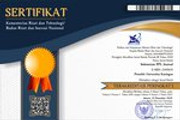PROJECT-BASED LEARNING TO DEVELOP STUDENTS' ABILITY AND CREATIVITY IN WRITING NARRATIVE STORY
Abstract
In English language teaching, project-based learning is not only able to optimize language skills but also other skills such as critical and creative thinking. This study tries to investigate the use of project-based learning to develop students’ abilities and creativity in writing narrative text and the students’ perception towards the implementation of project-based learning in writing course. This study employed a qualitative approach by involving second semester students who take writing course. The results of this study indicated that project-based learning can help the students to develop their ability and creativity in writing narrative text in several point including their understanding of the topic, their knowledge about narrative genre namely social function, structure of text, and language feature. In addition, the students also showed their creativity through creating their story line and designing the illustration of the story. Furthermore, the students gave positive views toward the implementation of project-based learning. They mentioned that they learned networking, collaborative learning, and team work through PBL. Thus, project-based learning can be one of alternative ways to teach writing in higher education.
Keywords: narrative text; project based learning; student creativity; teaching writing; writing skills.Full Text:
PDFReferences
Andrea, P., & Florica, M. (2013). Project-based learning in technical higher education. Applied Mechanics and Materials, 371, 739–743.
Bell, S. (2010). Project-based learning for the 21st century: Skills for the future. The Clearing House, 39–43. doi: 10.1080/00098650903505415.
Collier, L. D. (2017). Using a project-based language learning approach in the high school Spanish classroom: Perceived challenges and benefits. Brigham Young.
Derewianka, B., & Jones, P. (2012). Teaching language in context. Oxford: Oxford University Press.
Educational Technology Division. (2006). Project-based learning handbook: Educating the millennial learner. Kuala Lumour: Ministry of Education Malaysia.
Emilia, E. (2005). A critical genre-based approach to teaching academic writing in a tertiary EFL context in Indonesia. Melbourne: University of Melbourne.
Emilia, E. (2011). Pendekatan genre based dalam pengajaran bahasa Inggris: Petunjuk bagi guru. Bandung: Rizqi Press.
Essien, A. M. (2018). The effects of project-based learning on students’ English language ability (pp. 438–443). The 2018 International Academic Research Conference, Vienna.
Fragoulis, I. (2009). Project-based learning in the teaching of English as a foreign language in Greek primary schools: From theory to practice. English Language Teaching, 2(3), 113–119.
Hasani, A., Hendrayana, A., & Senjaya, A. (2017). Using project-based learning in writing an educational article: An experience report. Universal Journal of Educational Research, 5(6), 960–964.
Kalabzová, M. (2015). The application of project based learning in the English classrooms. University of West Bohemia.
Kimsesiz, F., Dolgunsöz, E., & Konca, M. Y. (2017). The effect of project based learning in teaching EFL vocabulary to young learners of English: The case of pre-school children. International Journal of Languages’ Education and Teaching, 5(4), 426–439.
Larasati, A. (2015). Improving students’ writing skills through project-based learning technique at grade XI of SMAN 2 Sleman in the academic year of 2014/2015. Yogyakarta state university, yogyakarta.
Martin, J. R., & Rose, D. (2008). Genre relations, mapping culture. London: Equinox Publishing Ltd.
Syahmadi, H. (2014). Bedah curriculum 2013 bagi guru bahasa Inggris. Bandung: Cv. Adoya Mitra Sejahtera.
Walker, R., & Rı´u, C. P. (2008). Coherence in the assessment of writing skills. ELT Journal, 62, 18–28. doi: 10.1093/elt/ccm074.
Zaki, A., & Rosa, R. N. (2014). using project based learning in teaching writing a procedure text to senior high school students. JELT, 2(2), 1–7.
DOI: https://doi.org/10.25134/ieflj.v5i1.1627
Refbacks
- There are currently no refbacks.

This work is licensed under a Creative Commons Attribution-ShareAlike 4.0 International License.

